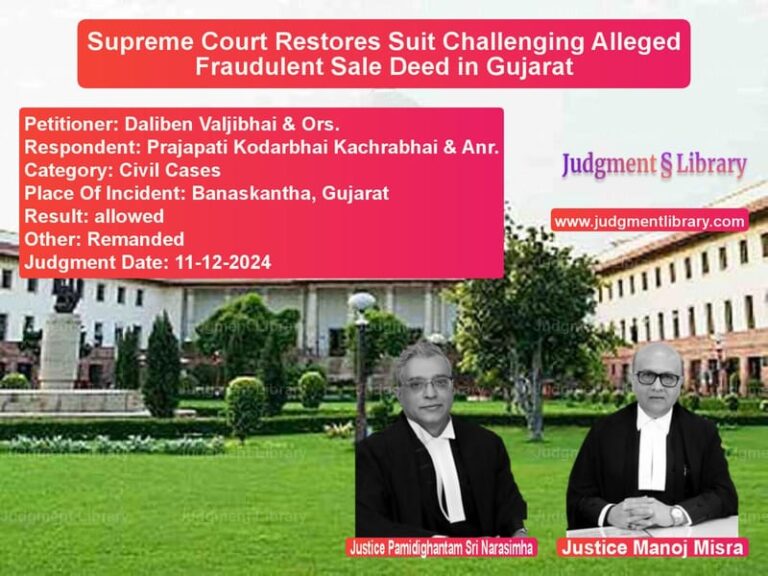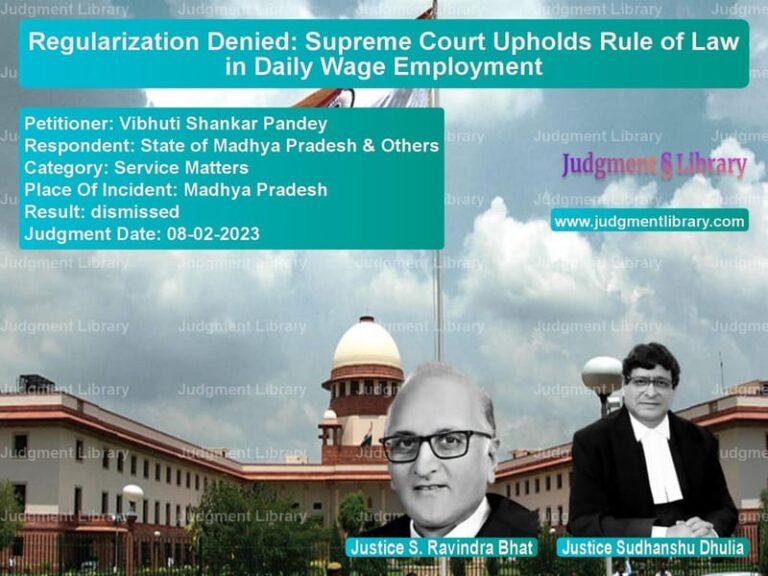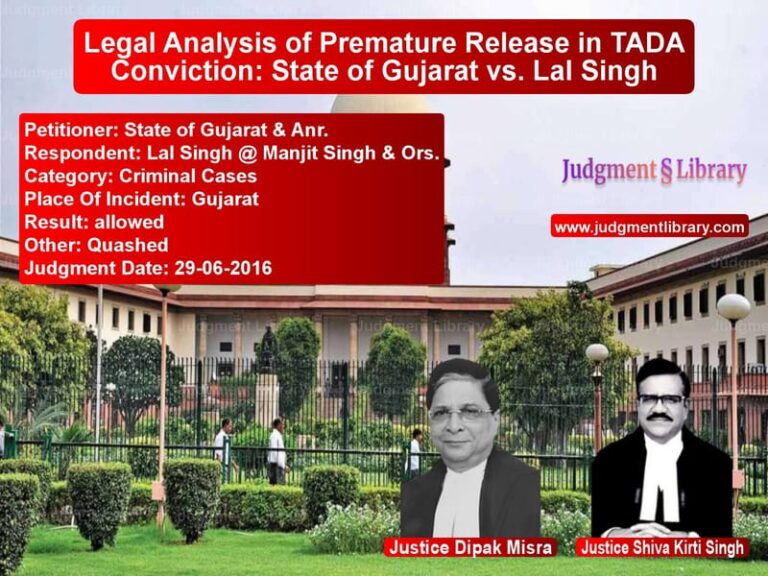Supreme Court Directs Strict Compliance with Police Report Requirements Under Section 173 CrPC
The Supreme Court of India recently delivered a landmark ruling in the case of Dablu Kujur v. The State of Jharkhand, emphasizing the importance of strict compliance with Section 173(2) of the Code of Criminal Procedure (CrPC). The Court directed law enforcement agencies to ensure that police reports (charge sheets) meet all legal requirements before submission to courts. The judgment aims to rectify long-standing issues related to incomplete and vague charge sheets that affect the fairness of criminal trials.
Background of the Case
The case involved an appeal by the accused, Dablu Kujur, who was denied bail by the Jharkhand High Court. The appellant was facing charges under Sections 302, 120B, and 34 of the Indian Penal Code (IPC), along with Sections 25(1-B), 26, 27, and 35 of the Arms Act. During the course of arguments, the Supreme Court was informed that the trial was at an advanced stage, with most prosecution witnesses already examined.
However, the Court noted serious deficiencies in the police report (charge sheet) filed under Section 173(2) CrPC. It was observed that the charge sheet lacked essential details and particulars, raising concerns about procedural lapses. The Court took cognizance of the fact that similar deficiencies were prevalent in charge sheets filed in Bihar and Uttar Pradesh as well.
Read also: https://judgmentlibrary.com/supreme-court-quashes-criminal-proceedings-in-business-contract-dispute/
Petitioners’ Arguments
The appellant’s counsel made the following arguments:
- The charge sheet against the accused was vague and lacked necessary details.
- Essential procedural requirements under Section 173(2) CrPC had not been followed.
- Failure to comply with legal mandates resulted in procedural unfairness.
- The appellant was entitled to bail, given the weak evidentiary foundation in the charge sheet.
Respondents’ Arguments
The State of Jharkhand defended the charge sheet and opposed the bail application, arguing:
- The case against the accused was strong, and the trial was nearing completion.
- Any defects in the charge sheet did not undermine the prosecution’s case.
- Since most witnesses had already been examined, the Court should not interfere at this stage.
- Granting bail could disrupt the ongoing trial process.
Supreme Court’s Observations
The Supreme Court scrutinized the charge sheet and found that it was “bereft of any details and particulars.” The Court stressed that compliance with Section 173(2) CrPC was critical for ensuring fair trials and preventing arbitrary prosecutions. The key observations included:
- Incomplete charge sheets violate procedural fairness: The Court held that vague and deficient charge sheets hinder the accused’s right to a fair trial.
- Law enforcement agencies must ensure strict compliance: The Court directed the Director General of Police (DGP) of Jharkhand to take corrective measures and ensure adherence to Section 173(2) CrPC.
- Similar concerns in other states: Noting that similar issues existed in Bihar and Uttar Pradesh, the Court ordered the DGPs of these states to submit reports on compliance measures taken.
- Trial court obligations: The Court emphasized that trial courts must examine charge sheets for completeness and reject those that fail to meet legal standards.
Key Judicial Remarks
The Supreme Court made several significant remarks regarding procedural compliance:
“The police report submitted under Section 173(2) CrPC is a crucial document for the prosecution, the defense, and the court. It is incumbent upon the investigating officer to strictly comply with statutory requirements. Non-compliance gives rise to multiple legal issues during trials.”
The Court further observed:
“We must ensure that the integrity of the criminal justice system is not compromised due to procedural lapses. Law enforcement agencies must take immediate corrective action to prevent incomplete or defective charge sheets from being filed.”
Directives Issued by the Supreme Court
The Supreme Court laid down comprehensive guidelines for compliance with Section 173(2) CrPC:
- Charge sheets must include:
- Names of all parties involved.
- Nature of the alleged offense.
- List of witnesses acquainted with case facts.
- Details on whether an offense has been committed and by whom.
- Accused’s arrest status and bail details.
- Copies of relevant medical examination reports in applicable cases.
- Police officers must ensure compliance with Section 169 CrPC if they decide not to forward the accused for trial.
- In cases where further investigation is needed under Section 173(8) CrPC, supplementary reports must be submitted with all required details.
- Trial courts must reject charge sheets that fail to meet these criteria and direct the investigating officer to rectify deficiencies.
Final Judgment
The Supreme Court ruled:
- The appellant’s bail application was denied, as the trial was nearing completion.
- The Jharkhand, Bihar, and Uttar Pradesh police departments were directed to submit compliance reports on charge sheet procedures.
- Trial courts must strictly enforce procedural compliance and reject incomplete charge sheets.
- Copies of the order were to be sent to the Chief Secretaries and Registrar Generals of all High Courts for implementation.
Conclusion
This ruling reinforces the importance of procedural compliance in criminal investigations and trials. By mandating strict adherence to Section 173(2) CrPC, the Supreme Court has taken a significant step toward enhancing the fairness and efficiency of the criminal justice system. The judgment serves as a warning to law enforcement agencies against filing incomplete charge sheets and ensures that accused individuals receive a fair trial based on legally sound documentation.
Petitioner Name: Dablu Kujur.Respondent Name: The State of Jharkhand.Judgment By: Justice Bela M. Trivedi, Justice Pankaj Mithal.Place Of Incident: Jharkhand, India.Judgment Date: 12-03-2024.
Don’t miss out on the full details! Download the complete judgment in PDF format below and gain valuable insights instantly!
Download Judgment: dablu-kujur-vs-the-state-of-jharkha-supreme-court-of-india-judgment-dated-12-03-2024.pdf
Directly Download Judgment: Directly download this Judgment
See all petitions in Bail and Anticipatory Bail
See all petitions in Public Interest Litigation
See all petitions in Legal Malpractice
See all petitions in Judgment by Bela M. Trivedi
See all petitions in Judgment by Pankaj Mithal
See all petitions in dismissed
See all petitions in Declared Infructuous
See all petitions in supreme court of India judgments March 2024
See all petitions in 2024 judgments
See all posts in Criminal Cases Category
See all allowed petitions in Criminal Cases Category
See all Dismissed petitions in Criminal Cases Category
See all partially allowed petitions in Criminal Cases Category







